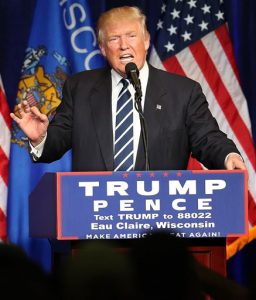By this time next week it will all be over, or the 2016 US presidential election will have spun off into entirely uncharted territory — a slender, contested result, calls for a recount, a refusal by millions of people to accept the outcome. But if fiction, as bestselling writer Stephen King once said, is the truth inside the lie, this election season has been particularly rich.
Perhaps because both main party candidates were so unusually well-known, and one was simply bizarre as a presidential nominee, it is fiction that has been used to understand the rip currents tugging voters this way and that.
Consider this. In its October 31 issue, the last before Election Day, the fussy and precise New Yorker magazine turned to a writer of historical fiction to tell Americans and everyone else what we should be thinking and feeling about the 2016 race for the White House.
Thomas Mallon, a well-regarded novelist who has previously written on the drama and dark comedy of Watergate and the Nixon presidency, took up the challenge. Mallon’s most recent offering covers the Reagan years and for a fictional portrayal of the 2016 campaign, he came up with a loathsome if compelling idea.
He chose a likely title Presumptive, not only to indicate that Hillary Clinton and Donald Trump were once duking it out within their respective parties to become the presumptive nominees, but also because of “its suggestion of presumptuousness”. For good measure, Mallon explained that “presumptive” satisfyingly echoed consumptive, thereby “suggesting an occupational disease that devours the body and spirit”. In other words, both Mrs Clinton and Mr Trump are profoundly sick to be running for high office.
Discounting the fact that Mallon actively dislikes Mrs Clinton and is a disgruntled Republican disgusted by his party’s choice of Mr Trump, the fiction-writer’s perspective could be one way to understand the psycho-drama that is this political season.
In the event of a Clinton win, would it really be true as Mallon writes that “Clinton will be as depressed as Nixon was the night of his landslide victory over McGovern, in 1972?” He says, “After winning, her fraud complex, the curse of the compulsive achiever, will kick in, and she will be bitter over the perception that she owes her victory to the mutant candidacy of Trump.”
In the event of a Trump victory, would acclaimed novelist Chimamanda Ngozi Adichie’s imagined account of the celebrity billionaire’s personal life come startlingly into focus? More troublingly, might it be found to have been accurate? In July, Adichie wrote a short story titled The Arrangements for The New York Times Book Review. It centred on Melania, Mr Trump’s pouting, smoky-eyed, fearsomely sculpted third wife, and employed all the fiction-writer’s deepest techniques of characterisation to portray some of the subliminal doubts voters might reasonably feel about Candidate Trump. In the short story, he’s the man who would save America but can’t even protect his immigrant wife from feeling used, unloved and undone by his obsession with himself and with his oldest daughter Ivanka. A subtly revealing line in the story reads: “Donald admired in his daughter qualities he would not abide in a wife.”
Adichie went on to portray Mrs Trump’s terror at the thought her husband might win the election, thereby shattering her hard-won life of “luxurious peace”. It describes her surprise that he has got so far in politics. “Americans were so emotionally young,” the Slovenian-born Melania is caught thinking in Adichie’s story, “so fascinated by what Europeans knew to be world-weary realities. They were drawn to Donald’s brashness and bluster and bullying, his harsh words, even the amoral ease with which untruths slid out of his mouth. She viewed these with a shrug — he was human, and he had his good points, and did Americans truly not know that human beings told lies?”
Some months before Adichie’s piece, Barack Obama’s former speech writer Jon Lovett wrote a beautifully-imagined “dispatch from the future”, titled Looking Backward on the Presidency of Donald Trump for The Atlantic magazine.
It considered the run-up to “President Trump’s” inauguration in January 2017 and made a number of bold predictions. “By the time President Trump raised his right hand and swore to preserve, protect, and defend the Constitution, the Constitution itself had been enlisted,” Lovett wrote. “In what Trump supporters called the ‘Christmas Coup’ and what everyone else called a historic act of national preservation, President Obama signed into law a bill passed with overwhelming bipartisan support … which reasserted congressional primacy over the republic and stripped away the presidential prerogatives that had accrued over the previous century.”
Lovett’s story predicted that “President Trump” was impeached and shown up as incompetent. And it explored the unspoken truths implicit in the fact that a manifestly unfit reality television star was running for president of a 240-year-old rich and advanced democracy. “Maybe Trump was a mirror,” Lovett wrote, “and we hated him because we hated what we saw in our reflection … In the end, Trump is what America had earned. Trump is what America deserved. Trump was our reckoning. And while his rise to power was born of our failings, it also forced us to find our strength.”
Fiction, as Virgina Woolf said, is like a spider’s web, attached ever so slightly perhaps, but still attached to life at all four corners. More so political fiction. It may have never been so relevant.


